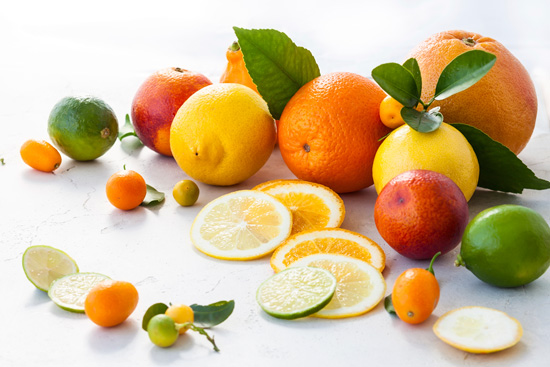About The Buzz: Citrus Fruits Fight Obesity-Related Diseases?

TheBUZZ Citrus Fruits Fight Obesity-Related Diseases?
WHAT THEY’RE SAYING
Dietitians, parents and marketing campaigns promote regularly consuming citrus fruits due to their high Vitamin C content. Consuming Vitamin C can indeed lead to substantial health benefits, including reducing the risk of some cancers, boosting the immune system, inhibiting arterial plaque (plaque buildup causes life-threatening heart disease) and strengthening connective tissue. Were you aware that regularly consuming Vitamin C also reduces a person’s risk of obesity-related diseases, such as heart disease, liver disease and diabetes?
WHAT WE KNOW
Antioxidants are substances that are found in many foods, including fruits and vegetables. Antioxidants help to prevent or delay cell damage by neutralizing free radicals 1. Your body naturally produces free radicals, and these chemicals play an important role in cellular processes. However, free radicals are highly reactive and have the potential to become hazardous at high concentrations and damage all major components of a cell, including a cell’s DNA, protein and cell membranes 2. The most common type of free radical contains the element oxygen and is called “reactive oxygen species” or “ROS”. Free radicals may play a role in the development of cancer and other life-threatening diseases. Because antioxidants neutralize free radicals and prevent them from causing extensive cell damage, antioxidants are also known as “free radical scavengers”. While your body produces some antioxidants on its own, it also relies on external sources of antioxidants, found in food, to obtain all of the antioxidants it needs to neutralize all free radicals.
When a person consumes a high-fat diet, their body begins to accumulate fat. This is due to the excessive caloric intake, or in other words, they’re consuming more calories than they’re burning each day, which leads to fat accumulation (also known as weight gain). The body’s fat cells produce ROS, which damage cells through oxidative stress. Oxidative stress is the process of cell damage by free radicals. Obese individuals have very enlarged fat cells, which cause very high levels of oxidative stress and the body becomes overwhelmed and is unable to fight off the ROS with antioxidants.
This is where fruits and veggies come in, especially citrus fruits, due to their high antioxidant content. Citrus fruits are especially high in a class of antioxidants called citrus flavanones, which help to lower oxidative stress in the body.
THE STUDY
Recent research presented earlier this year at the National Meeting & Exposition of the American Chemical Society showed that citrus flavanones helped to lower oxidative stress in mice 3. In the study, researchers fed mice different types of diets: a standard diet, high-fat diet without flavanones, and a high-fat diet with flavanones (specifically, hesperidin, eriocitrin or eriodictyol).
RESULTS OF THE STUDY
The high-fat diet without flavanones increased cell damage markers by 80 percent in the blood and by 57 percent compared to mice on the standard diet. The high-fat diet with flavanones hesperidin, eriocitrin and eriodictyol decreased the cell damage in the liver by 50 percent, 57 percent and 64 percent, respectively, compared with mice fed a high-fat diet but not given flavanones. In addition to reducing liver cell damage, these compounds also reduced fat accumulation in the liver. Finally, the flavanones also reduced cell damage in the blood by roughly 48 percent. While feeding the mice flavanones did not result in weight loss, the mice were made healthier by lowering their oxidative stress.
OUR ADVICE
Overweight and non-overweight individuals alike can benefit greatly from regularly incorporating citrus fruits into their diets, as weight is not the only factor in disease development and susceptibility. Genetics and lifestyle habits, such as physical activity and alcohol consumption, influence a person’s health. In addition to antioxidants, citrus fruits, which include oranges, lemons, limes, grapefruits, tangerines and pomelos, provide the body with fiber and many other important vitamins your body needs to stay strong and fight illness 4.
While the process of developing many types of cancer have yet to be fully understood by researchers and doctors, studies have shown that citrus fruits can play an important role in lowering a person’s chances of developing cancer through neutralizing free radicals. Consuming foods rich in antioxidants, such as citrus fruits, can effectively combat some of the damage our bodies experience on a daily basis through factors that are beyond our control that can cause cancer. For example, living with a parent who smokes, air pollution or radiation exposure, can influence a person’s risk of developing cancer 5. Eating fruits and veggies can protect your body while also helping you maintain a healthy weight and feel great, too!
Video Center: Selection. Storage. Preparation.
How Many Cups Do You Need?
Key Nutrients in Fruits & Vegetables
Fruit & Veggie Database


